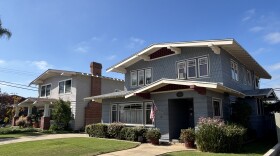A vacant home in a decent neighborhood used to be a rarity.
But in cities around the country, homeowners and investors — unable to afford the homes they bought — are abandoning their properties, marring the neighborhoods they leave behind.
In Phoenix, once one of the nation's hottest markets, tens of thousands of homes are vacant. The bulk of the homes were owned by investors who hoped to profit from booming housing prices.
Keevin Simpson bought a 20-year-old home in North Phoenix last year hoping to fix it up and sell it at a big profit. He spent $40,000 gutting the house, putting in new walls, ceilings and appliances. But he's now putting it on the market for less than he'd planned. His home is competing with a record 55,000 homes for sale in the Phoenix area. Of those, nearly 40 percent are vacant. Foreclosures, which are not on the market, are not included in those vacancies.
Simpson hired Donna Butera, a home "stager" who fills vacant homes with furniture to make them looked lived-in — but not too lived-in.
"The basics are no kids, no pets, no laundry, no dishes. That's the perfect house," Butera says. "Everybody has those items, or most people do, but when you're house hunting — for that brief experience — they don't exist."
Butera — herself an investor with six homes for sale — says there is fear in the market because of the crisis in subprime lending, combined with falling home prices.
"What you have now is a house that's worth $270,000 that you paid $350,000 for and your loan is due ... nobody is going to pay that," she says. "And that's where you're getting into this problem with foreclosure. You cannot sell it."
When they are forced into foreclosure, Butera says some owners trash their homes before they are repossessed.
"They are selling everything inside — their kitchen cabinets, their toilets, their AC units ... and it's hurting the neighborhood," Butera said. "The house now looks like a crack house — it's missing all its windows."
Jay Butler, director of realty studies at Arizona State University, says many homes could be saved if owners would just talk to their lenders — assuming their lender is still in business.
"The homeowner is embarrassed," Butler said. "They can't make the payments. Maybe they don't want to tell their spouse or others in the family that they can't do it, so they simply walk away from the home."
Copyright 2022 NPR. To see more, visit https://www.npr.org. 9(MDAzMjM2NDYzMDEyMzc1Njk5NjAxNzY3OQ001))







